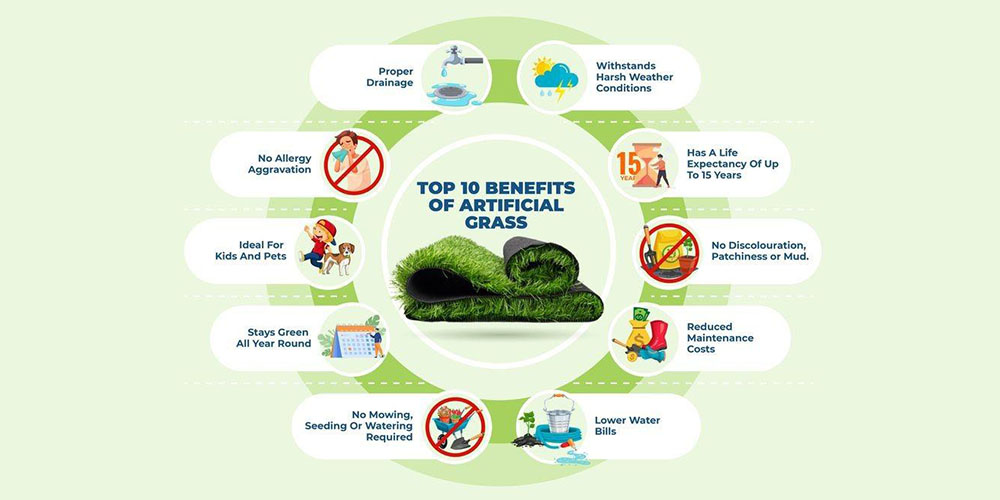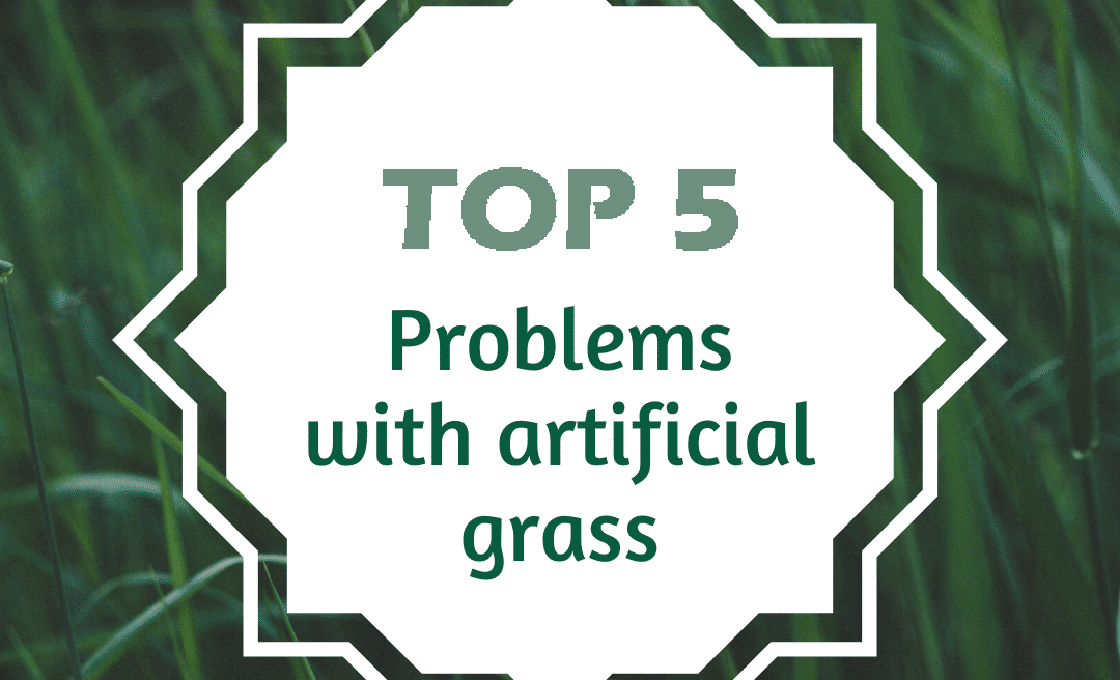Artificial grass is the latest craze in the world of landscaping. But is this the best solution for your yard?
More and more home gardens and lawns are switching to some type of artificial grass. This outdoor carpet of fake grass has many different types such as in-fill, non-in-fill, and hybrid grass. The ones used at home are in-fill as well as 3G and 4G sports pitches. NFL, World Cup, and Rugby Superteam competitions all use hybrid grass which is a combination of real and fake grass.
While artificial turf has become a trend, a good number of homeowners still turn up their noses to this option. Some think it’s practical and cost-efficient but not everyone agrees. So we set out the pros and cons so you can weigh your options.
Contents
What are the pros of artificial grass?

Terrific for under trampolines and above-ground pools
This is a seldom-listed advantage of artificial grass. Natural grass tends to die under trampolines and small kiddy above-ground pools because it doesn’t get sunlight. If you know you’re going to put in these fun backyard items, consider sectioning it off for artificial grass. I know from firsthand experience with my friend’s backyard down the road where he has artificial turf under their large trampoline. Just for fun, he put in a small putting green next to the trampoline.
Looks good all the time (with no effort)
The artificial grass you can buy looks amazing… just like real grass. It stays green year-round, is the perfect height all the time (no mower required) and frees up those nights you need to bust out the lawnmower. Win, win, and win.
Play on it year-around
I love tossing the ball around with my boys, but when the lawn is soaked, it’s not so fun. With artificial grass, you can go out there any time because it dries pretty fast after a rain. This is a huge benefit for me.
No pesticides or fertilizers needed
Unlike a traditional natural lawn that requires pesticides and fertilizers to look its best and be free from grabs and other pests, artificial grass does not require any of these dangerous chemicals to be put on it. This means you do not have to worry about the safety of your pets or your children playing in the yard and becoming covered in dangerous chemicals.
Durable / Long-lasting
Artificial grass is incredibly durable and has a flat surface on which children and pets can play. Because it is so durable and because there are no uneven patches of grass, this type of yard will last significantly longer than natural grass. Although patches may occur over time due to wear and tear, the yard will generally last for a long time before needing repair or replacement.
Don’t need to water
Homeowners love that they do not have to water their yard for it to look its best. Not only is this good financially (lower water bills), but it’s also good for water conservation. This means that after the initial expense of having artificial grass installed at your home, you will not have to pay for weekly upkeep to keep it looking green.
Lower maintenance cost (compared to regular grass)
There are fewer preservation costs associated with artificial grass than there are with real grass. Unlike a natural yard in which you have to mow, fertilize, weed eat, and spray pesticides regularly to keep it looking its best, artificial grass does not need all of this extra care. It may, from time to time, require refilling, vacuuming, and mild repairs, but these are significantly less expensive upkeep options over traditional lawn care.
Because artificial grass will not be ruined easily due to its durability, it can be played on, no matter the weather conditions. Unlike traditional lawns that can be easily torn up when it is wet outside, artificial grass can be played on all year long.
What are the cons of artificial grass?

Off-gassing/chemicals
There are some concerns over the quality of artificial grass installed in certain areas and whether or not it contains toxic chemicals. To ensure that everyone on the artificial grass is completely safe at all times, it is important to make sure to buy from a company that guarantees the safety of their product.
Gets hot in the heat
While you can play on artificial grass during the time of year, during the hot summer when it is exposed to the sun for the majority of the day, it can become quite hot and uncomfortable. It is not uncommon for the temperature of artificial grass on a surface to be 37° warmer than the air temperature around it.
Runoff
Runoff is a major concern with artificial grass as any chemicals that are in the product can easily be taken to water sources. Hard rainstorms are a problem as they can cause a lot of water runoff that may potentially be toxic.
Toxic materials and harmful chemicals
Some medical experts believe that there is enough lead in the artificial grass to pose health hazards, especially to children. They state that the amount of lead in the product is enough to cause decreased development, mental retardation, and even death with prolonged exposure.
Asthmatics will most likely struggle to breathe after playing on artificial grass for an extended period due to its effects on asthma.
Become a breeding ground for certain bacteria
Unlike natural grass which can not only withstand some bacteria but also allow cells and other materials to seep into the ground, artificial grass can become a breeding ground for certain bacteria. Studies have shown that staphylococci can stay on the type of plastic used in the production of artificial grass for more than 90 days. Additionally, any blood, skin, or other biological materials that are left on artificial grass will not easily wash away into the ground unless they are specifically removed by a person.
Artificial Grass Frequently Asked Questions
Who, When, and Where Was Artificial Grass Invented?
Artificial grass was invented in 1965 by James M. Faria and Robert T. Wright. It was first used at the Houston Astro Dome for the Houston Astros Baseball Team in 1966. Before this, there were various incarnations of what is now often called AstroTurf, such as Chemgrass. In 1964, this product was installed at the Moses Brown School in Providence Rhode Island by the Creative Products Group. It was the first large-scale installation of synthetic grass.
What are the different terms used referring to artificial grass?
There are many terms used when referring to artificial grass and they are used interchangeably. Here’s a bunch:
- synthetic grass
- artificial turf
- astroturf
- artificial lawn
- turf grass
- synthetic turf
- synthetic lawn
How Long Does Artificial Grass Last?
High-quality artificial grass can last more than 2 decades, with some making it up to and past 25 years. One main factor affecting its durability over time is the placement of the turf. If it is installed in a high-traffic area, then it will not last as long as artificial grass placed out of the path of foot traffic.
The climate also plays a role. If the artificial grass is constantly in direct desert sunlight, then it will deteriorate much faster than artificial grass placed in the shade.
Can Artificial Grass Be Repaired?
Yes. Depending on the extent of the damage, you may be able to make the repairs yourself. There are many videos and articles on the internet that walk you through various types of repairs that are within reach of non-professionals.
However, more extensive damage may require you to hire a professional. In some cases, the damage may be so extensive, that it may make more sense to simply replace the entire patch.
Can Artificial Grass Be Recycled?
Yes. However, recycling artificial grass is more difficult than recycling common household items such as cans, boxes, and bottles. Artificial grass is composed of more than one material, and these materials must be separated during the recycling process, this takes time and equipment. Because of this, it is not recycled as intensively.
Can Used Artificial Grass Be Resold?
Yes. Used artificial grass is a new and growing industry thanks to businesses dedicated to repurposing artificial grass. Going this route is much cheaper than buying new ones. Companies are out there that specialize in recycling and repurposing used artificial grass for customers who want the benefits it offers without the high prices.
Is Some Artificial Grass Heat Resistant?
Yes. Many of these products are tested and confirmed to be heat resistant. Check the package or website of a product you are looking into and you will see if it has been confirmed to be heat resistant. When artificial grass is not very heat resistant, then it will deteriorate more quickly in the sun. In general, the thicker blades of artificial grass tend to withstand the heat longer than the thinner ones.
Can Artificial Grass Be Cleaned With a Vacuum?
Vacuuming may damage your artificial grass, especially if it is laid with infill. The infill will be sucked right up. However, if it is not laid with infill, then there is less danger to the artificial grass. That being said, there still exists the risk that the suction of the vacuum over time would start to loosen the grip the artificial grass has on the ground. This loosening could lead to more of the artificial grass being pulled up over time thus ruining the look and feel of it.
Can Artificial Grass Be Laid on Concrete?
Yes. However, there are some concerns. One is drainage. When artificial grass is installed over the bare earth, it drains as does the soil underneath it. However, when installed over concrete, drainage doesn’t happen without taking certain measures, such as installing a layer of tile or sand between the artificial grass and the concrete.
Another concern of artificial grass on concrete is the hardness of concrete. You will lose the soft feeling of real grass when you put artificial grass on concrete.
The concrete should also be in good condition and as clean and flat as possible. Lumps and bumps on the surface will make applying the artificial turf more difficult.
Can Artificial Grass Be Laid on Decking?
Yes. This, of course, assumes that your decking is in good condition. Unlike the earth and concrete, wooden decks can and do rot away if not protected and maintained correctly. So it’s very important to install the artificial grass on a deck that is in top shape. Failure to do so will result in premature deterioration of your turf.
Can Artificial Grass Be Laid on a Slope?
Yes. Logistics are slightly different than when installing artificial grass on a flat area, but this is doable and is quite common. Also, it is often recommended as an alternative to living landscapes when too much sloping is involved on a piece of land. Too much sloping can be challenging with living plants and grass due to watering and other difficulties.
Can Artificial Grass Be Laid on Soil?
Yes. In fact, for best results, artificial grass should be laid on top of compacted sandy soil. If your soil has too much clay in it, it may not drain properly and this could cause damage to your turf. The remedy for this is to add a more drainage-friendly layer of soil on top of the clay. Once this new layer is compacted, you are ready to go.
